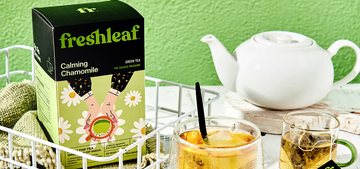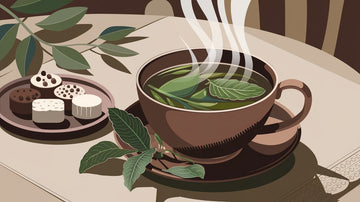If there’s one herb that has quietly stood the test of time in Indian households, it’s Tulsi. From dadi’s home remedies to chai-time conversations, Tulsi has always had a special place in our cups and hearts. But beyond the nostalgic whiff of freshly brewed Tulsi tea, green tea, this herb carries a treasure trove of benefits that make it more relevant today than ever before.
So, in this blog, I’ll talk about the Tulsi tea. Now, this won’t just be your average educational blog; this one will include something special. Well, nothing too special, just my personal opinion and anecdotes. So, let’s start with the basics for you newbies, what is tulsi?
What is Tulsi?
With words like “god”, “goddess”, “king”, “queen”, “deity”, “holy”, and “divine” often seen in texts describing tulsi, you know the plant is bound to have a special history. Used in Indian culture as a religious, spiritual, and healing herb for more than 5,000 years, tulsi (or holy basil) is newer to Western culture and is often found as an ingredient in herbal medicines, tinctures, and essential oils. Dried tulsi leaves can also be steeped to create an invigorating herbal tea.
So, how exactly did this herb end up in our teacups? Well, for me, it was my mother, but I was talking about the bigger picture. There were no issues, so let’s see, I’ll tell you.
How is Tulsi Green Tea Grown?
Tulsi (Ocimum tenuiflorum or Ocimum sanctum) is commonly known as holy basil. “Holy” because of its history of religious and spiritual significance, and “basil” because it comes from the same perennial herb and shrub family as the common cooking basil. Tulsi is part of the Lamiaceae family of aromatic flowering herbs that also contains mint, sage, oregano, rosemary, and lavender.
Tulsi is native to the Indian subcontinent and flourishes in humid, tropical climates. It is widely grown and cultivated throughout the Southeast Asian tropics. It grows as an erect branched shrub that reaches up to 60cm tall and boasts furry stems, fragrant purple or green leaves, and small white to purplish flowers that shoot out the tip of the branches. Its leaves are cultivated, picked, and dried for us in herbal tea applications.
There are three major varieties of the tulsi plant, each with different characteristics:
-
KRISHNA
Known as purple leaf tulsi for its most marked characteristic of purple leaves and blossoms, this plant has the spicy aroma of cloves, and its leaves mimic the sharp, crisp flavors of pepper. It’s widely grown across India and is often found decorating private homes and gardens.
-
RAMA
Boasting green leaves and white or light purple flowers, this green leaf tulsi is known for its clove-like aroma. It has a more cooling and mellow flavor than purple leaf tulsi. It’s grown across India but can also be found in China, Nepal, Bengal, and Brazil.
-
VANA
This wild leaf tulsi is indigenous to Asia and parts of Africa. It can be found growing wild as well as cultivated in the Himalayas and across the plains of India. The plant boasts light green leaves and has more of a refreshing citrus aroma and flavor than its spicy cousins.
Well, this might come as a surprise to some of you, but Tulsi is actually considered to be a goddess, interesting right? Well, don’t worry, I’ll tell you the story.
The historical relevance of Tulsi in Indian mythology
As a plant with religious and spiritual significance, tulsi has a rich history of legends to explain how it came to be and why it is worshipped.
One such legend marks the plant as the earthly manifestation of Lakshmi, the goddess of wealth and principal consort to the Hindu god Vishnu. Lakshmi was one of Vishnu’s three wives and perhaps his favorite. Jealousy ensues, and the other two wives curse Lakshmi to be born on earth as a plant. The other two wives, Ganga and Saraswati, then curse each other to be born on earth as rivers (the Ganges River and the Saraswati River). Vishnu comforts Lashmi that she will be born on earth as the tulsi plant, but only part of her will be rooted on earth as a plant, and her spirit will return to be connected with him.
Another legend relates tulsi to the Samudra Manthana, the churning of the cosmic ocean by the gods and demons. At the end of the churning battle, Dhanvantari, the physician to the gods, rises victorious from the ocean with the elixir of immortality and offers it to the gods. The Hindu god Vishnu sheds happy tears for the gift, the first of which fell into the elixir and sprouted the tulsi plant.
Yet another legend regards the tulsi plant as a threshold point between heaven and earth. A traditional prayer states that the creator-god Brahma resides in its branches, all Hindu pilgrimage centers reside in its roots, the Ganges River flows through its roots, all deities in its stem leaves, and the Hindu scriptures in the upper part of its branches.
How does Tulsi taste?
Tulsi is typically noted to have a strong aroma and an astringent, sometimes bitter flavor. Being related to the culinary basil family, it can have floral and peppery notes as well. Some types of tulsi may also have a clove-like aroma and spiced flavor, while others may yield a fresh, lemony aroma and flavor. Our Freshleaf’s Tulsi Treat Green Tea is a blend of our naturally grown tea leaves from Assam and tulsi leaves.
What are the benefits of Tulsi tea?
Unlike your regular cup of chai or black tea, Tulsi tea is caffeine-free and naturally packed with adaptogens. (And no, adaptogens are not some sci-fi element; they’re compounds that help your body adapt to stress.) But that’s just the beginning. Here’s why Tulsi tea deserves a prime spot in your kitchen:
-
Tulsi tea can help relieve stress
Ever felt like you’re juggling too many things at once? Tulsi tea can help. Studies show that Tulsi reduces cortisol levels (your stress hormone), making it a natural stress reliever. So, the next time life feels like a never-ending to-do list, swap your coffee for a cup of Tulsi tea. Your nerves will thank you, believe me, you’ll hear them thanking you.
-
Help improve your immune system
“Beta, Tulsi ka kadha peelo,” is something every Indian has heard at least once during flu season. Tulsi is packed with antioxidants, antibacterial, and antiviral properties that help your immune system fight off infections. Turns out, dadi’s advice was backed by science all along.
-
Tulsi can help improve your digestion and heal your Gut
If your stomach throws tantrums after every heavy meal, Tulsi tea might just be the peace treaty it needs. It helps with digestion, reduces bloating, and even soothes activity. Plus, it promotes a healthy gut microbiome, which is basically your second brain when it comes to overall health.
-
Tulsi can be great for your heart health
Tulsi tea is known to help regulate blood pressure and cholesterol levels, making it great for heart health. With heart diseases becoming more common due to modern lifestyles, adding Tulsi tea to your routine is a simple yet effective step toward better cardiovascular health.
-
Tulsi is a natural detoxifier
From pollution to processed food, our bodies deal with toxins daily. Tulsi tea acts as a natural detoxifier, helping cleanse your system and rejuvenate your body from within. Think of it as a gentle reset button for your body.
How to make the perfect cup of Tulsi tea
Well, believe me, only the story is very extensive, the brewing process is way simpler than that. Well, here’s how you can make your treatful cup at home:
Ingredients:
-
1 cup water
-
Freshleaf’s Tulsi Treat green tea sachet
-
½ tsp honey (optional, but hey, it’s good)
-
1 tsp lemon juice (optional, well, it depends on your taste preferences, so experiment and find out)
Steps:
-
Boil a cup of water in a saucepan
-
Add the Tulsi leaves and let them simmer for 5-7 minutes
-
Strain into a cup, add honey or lemon if desired, and enjoy!
Final Thoughts
Tulsi tea isn’t just another health fad, it’s an age-old remedy that has stood strong for centuries. It’s simple, effective, and fits seamlessly into modern-day life. So, why not make it a part of yours?
Try Freshleaf’s premium Tulsi tea today and experience the goodness of this ancient herb in every sip. Because sometimes, the best solutions are the ones we’ve known all along.


